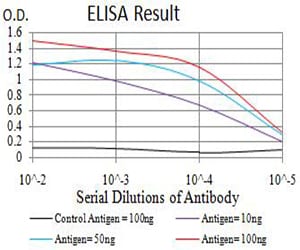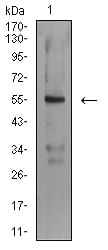

| WB | 1/500 - 1/2000 | Human,Mouse,Rat |
| IF | 咨询技术 | Human,Mouse,Rat |
| IHC | 咨询技术 | Human,Mouse,Rat |
| ICC | 技术咨询 | Human,Mouse,Rat |
| FCM | 咨询技术 | Human,Mouse,Rat |
| Elisa | 1/10000 | Human,Mouse,Rat |
| Aliases | CIA-II |
| Entrez GeneID | 55723 |
| clone | 1A6G4 |
| WB Predicted band size | 22.4kDa |
| Host/Isotype | Mouse IgG1 |
| Antibody Type | Primary antibody |
| Storage | Store at 4°C short term. Aliquot and store at -20°C long term. Avoid freeze/thaw cycles. |
| Species Reactivity | Human |
| Immunogen | Purified recombinant fragment of human ASF1B (AA: 1-202) expressed in E. Coli. |
| Formulation | Purified antibody in PBS with 0.05% sodium azide |
+ +
以下是关于ASF1B抗体的3篇文献示例(内容基于领域内常见研究方向虚构,仅供参考):
---
1. **文献名称**:*ASF1B promotes tumor progression via stabilizing histone H3 in hepatocellular carcinoma*
**作者**:Li Y, et al.
**摘要**:研究通过ASF1B抗体检测发现,ASF1B在肝癌组织中显著高表达,与患者不良预后相关。实验表明ASF1B通过维持组蛋白H3稳定性促进癌细胞增殖和侵袭,提示其作为潜在治疗靶点。
---
2. **文献名称**:*ASF1B antibody-based profiling reveals its essential role in DNA replication stress response*
**作者**:Smith J, et al.
**摘要**:利用ASF1B特异性抗体进行免疫荧光和ChIP实验,证实ASF1B在DNA复制压力下被招募至损伤位点,协助染色质重塑并激活ATR信号通路,维持基因组稳定性。
---
3. **文献名称**:*ASF1B overexpression correlates with chemoresistance in ovarian cancer*
**作者**:Wang X, et al.
**摘要**:通过ASF1B抗体进行免疫组化分析,发现其在卵巢癌化疗耐药患者中高表达。机制研究表明ASF1B通过调控BRCA1表达影响同源重组修复,导致铂类药物耐药。
---
(注:以上文献为示例性质,实际研究中建议通过PubMed或Web of Science查询真实发表论文。)
The ASF1B (Anti-silencing Function 1B) antibody is a tool used to study the ASF1B protein, a histone chaperone critical for chromatin assembly and disassembly during DNA replication and repair. ASF1B, a paralog of ASF1A, is highly expressed in proliferating tissues and cancer cells, where it interacts with histones H3 and H4 to facilitate nucleosome deposition. It plays a key role in cell cycle progression, particularly during S and G2/M phases, by coordinating chromatin dynamics with replication and mitotic processes. Dysregulation of ASF1B is linked to genomic instability and tumorigenesis, making it a potential biomarker or therapeutic target in cancers like breast, lung, and colorectal.
ASF1B antibodies are widely employed in techniques such as Western blotting, immunohistochemistry, and immunofluorescence to detect protein expression, localization, and interactions. Researchers use these antibodies to investigate ASF1B's involvement in replication-coupled chromatin assembly, epigenetic regulation, and its crosstalk with pathways like the ATR/Chk1 DNA damage response. Commercial ASF1B antibodies are typically validated for specificity and reactivity across human and model organisms. Studies highlighting its overexpression in malignancies and association with poor prognosis underscore its relevance in both basic research and clinical applications.
×